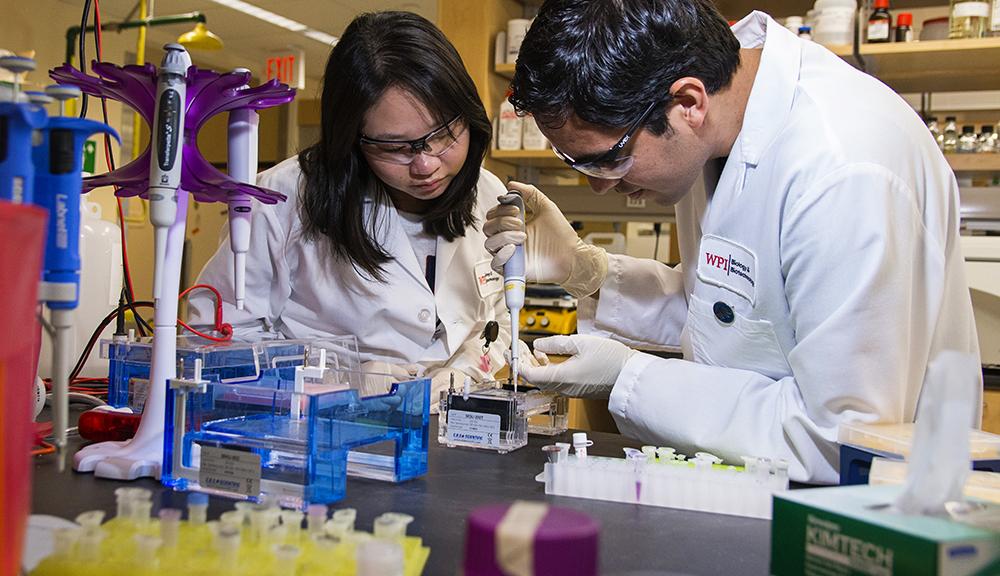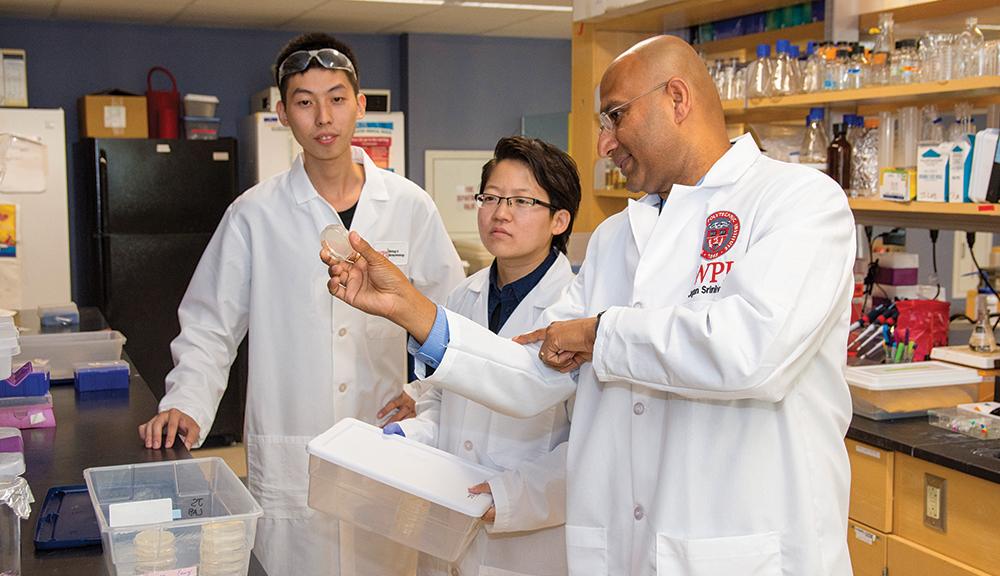As a student in WPI’s PhD in Biology and Biotechnology program, you will benefit from close mentorship by dynamic faculty who encourage creativity and inquisitiveness.
Enabled by a world-class research infrastructure, students in our competitive program explore their passion for discovery while driving cutting-edge, hypothesis-driven research. You will work alongside interdisciplinary teams of WPI faculty, peers, and industry partners to make an impact in your field and explore topics that matter to you, from cancer biology and immunology research to studies of brain plasticity and pollinator decline.

Through our well-rounded PhD in Biology and Biotechnology, you will delve into immersive research in biology and biotechnology while also sharpening your professional and pedagogical knowledge and skills. You will take core courses covering professional ethics, grant writing, and experimental design, and hone your communication skills by participating in department-wide research presentations. You may also take part in supervised teaching experiences and discuss interdisciplinary research initiatives in our Journal Clubs.
Students complete a qualifying exam by the end of the second year of study and round out required coursework with electives. Completion of PhD studies concludes with the preparation of a written thesis and successful oral defense.
To treat many infectious diseases, including the global scourge of tuberculosis, doctors must do battle with a wily adversary, bacteria. Unfortunately for afflicted patients, bacteria have also acquired strategies for thwarting attacks from the immune system and the onslaught of antibiotic drugs. We need to know more about the strategies bacteria use to survive stresses. Biology and biotechnology professor, Scarlet Shell, is seeking to do just that by probing the molecular changes that underlie these mechanisms.
WPI's Department of Biology and Biotechnology is home to a diverse and dynamic faculty body that employs cutting-edge research to explore and understand research topics at the intersection of biology and technology. You will work alongside them as you make your own discoveries in these research areas:
- cancer cell biology
- cognition and behavior
- cytoskeletal dynamics
- drug resistance
- epigenetics and gene regulation
- infectious diseases
- neuronal migration and degeneration
- regenerative medicine
- signal transduction mechanisms

Grad students work closely with faculty and with each other. The opportunity for potential brings new ideas to the forefront and enhances the work everyone does here.

Students in WPI’s BBT program have access to the state-of-the-art labs and multidisciplinary collaborations in the Life Sciences & Bioengineering Center at Gateway Park.

Well-equipped BBT facilities mean you’ll be supported in your research endeavors whether that involves an AAALAC-accredited vivarium with surgical suites, NMR, or a greenhouse.

WPI’s biology and biotechnology graduate degree programs are rigorous yet flexible to provide students with the appropriate backgrounds in both the theory of biology and the practice of biotechnology.

Work in WPI’s biology and biotechnology labs has real-world applications that impacts problems on a human scale.

The BBT program is rigorous, flexible, and comprehensive, so students are prepared for whatever the next step in their career path brings.
PhD candidates are encouraged to review the department's faculty pages to identify potential advisors.
You will have access to state-of-the-art equipment in WPI’s Life Sciences and Bioengineering Center, a research complex where an open-plan lab and presence of biotech companies encourage interdisciplinary collaborations. Facilities include an analytical instrumentation core equipped for NMR, Mass Spec, X-Ray Crystal, and qPCR analysis; imaging core with advanced microscopes for point-scanning confocal, spinning disk confocal, and TIRF microscopy; and AAALAC-accredited vivarium.
Faculty Profiles

Work in my lab is focused on defining the cellular mechanisms that maintain genome stability in normal cells and understanding how these pathways are corrupted in cancer cells.

Defining signaling pathways that program cellular diversity is one of the foremost problems in biology and is central to my research interests. In the lab we use molecular, genetic, and biochemical approaches to characterize the function of these pathways and to gain insight into their role in disease. To date, the lab has focused on the Epidermal Growth Factor Receptor network, a principal therapeutic target for a variety of human cancers.

I deeply enjoy teaching, in particular conveying the important roles played by plants. It is a great reward when my students realize that plants are more complex and interesting than they anticipated, and they want to learn more. I enjoy that students at WPI are open about thinking in new ways; this critical thinking is the result of intense project-based learning.
Prof. Weathers is an internationally recognized expert on Artemisia annua and artemisinin, having worked with the plant and its phytochemicals including the antimalarial drug, artemisinin, for >25 years. She is a Fellow of AAAS and SIVB, won many awards, given many national and international presentations, reviews manuscripts for many journals and proposals for many national and international funding agencies. She is an Associate Editor for multiple journals. Her lab was the first to genetically transform A. annua.

Our lab investigates the molecular basis of phenotype switching in human fibroblasts that can be modulated using defined extracellular stimuli. We evaluate the role of oxygen and growth factor FGF2 isoforms independently and in combination in order to identify key molecular mechanisms and pathways, some of which closely mimic mechanisms described in human embryonic stem cells. Extended lifespan of these cells in culture also offers us a model for investigation of molecular mechanism that are regulating cell cycle in the context of both aging and cancer.

My lab works broadly in the emerging field of synthetic biology. Synthetic biology seeks to apply engineering design principles to the understanding and creation of biological systems. I use synthetic biology to design biosensors and bioremediation strategies for various environmental contaminants that impact human health, including lead, arsenic, and other toxic substances. We apply the tools of synthetic biology to address global challenges related to water, soil, and human health.

Research in my laboratory addresses questions in the field of evolutionary ecology and environmental biology, and typically combines field work and laboratory studies. Current projects focus on two disciplines.

A member of the WPI faculty since 2004 and chair of the Department of Biology and Biotechnology since 2022, Reeta Rao is a leader in the field of molecular genetics and genomics. Her primary research activities are focused on emerging infectious diseases, specifically understanding and managing fungal diseases. Students and research associates in her laboratory are trained to use a variety of biochemical, molecular-genetic, and genomic tools to study host-microbe interactions to explore fungal virulence strategies and identify novel therapeutics in a high through

I have a passion for understanding how living systems work, as well as for sharing my love of biology and research with the next generation of scientists and informed citizens.
The central goal of my lab is to understand the regulatory mechanisms that underlie mycobacterial stress tolerance. We combine genetics, genomics, transcriptomics and biochemistry to understand how mycobacteria respond to, and ultimately survive, stressful conditions.

It has been my lifelong dream to become a professor in the field of Biology. Being a faculty member provides a great opportunity to teach and interact with students. Students by nature are highly inquisitive and motivated, and as teachers, we have the responsibility to guide our students to explore and think in new ways. I believe that teaching is a two-way interaction between teachers and students. I come from India and my parents, both of whom were teachers, taught me to strive for excellence in my scholarly pursuits.
- Patrick
- PhD Student
Refer a Friend
Do you have a friend, colleague, or family member who might be interested in Worcester Polytechnic Institute’s (WPI) graduate programs? Click below to tell them about our programs.
Earn a Master’s Degree in Biology & Biotechnology First
Are you interested in making advanced discoveries about living organisms in a robust community of like-minded researchers, but need your master’s to get there? Consider earning a master’s in biology and biotechnology where you’ll participate in cutting-edge laboratory training and gain professional training in areas like experimental design, ethics, and more. Do you prefer advancing a career in the biotech industry from making cross-functional decisions to gaining expertise in bio-production? Our online master’s in biotechnology is a skills-focused program perfect for students who are working professionals looking to study part-time. Maybe you have a strong foundation in computer science and statistics? Consider earning a master’s in bioinformatics and computational biology which dives into leveraging biological data to improve health care.
Get Started with a BS in Biology & Biotechnology or a Minor in a Related Field
If you’re interested in the field but need your initial degree, a bachelor’s in biology & biotechnology is the first step. This degree introduces you to how the theory of biology is put into practice with biotechnology. If your interest lies in gaining enough information to use in a different discipline or practice, WPI has minors that will deliver the skills and knowledge you seek. A minor in biology is an excellent addition to your academic program and will be relevant in many industries including biomechanics, big data, or personalized medicine. Or maybe you’re seeking a global perspective. WPI’s interdisciplinary minor in global public health examines biological, social, political, environmental, and economic influences on the health of diverse and varied populations.
WPI is proud to be the recipient of not one, but two National Science Foundation Research Traineeship programs. The programs provide exceptionally talented graduate students with specialized training and funding assistance to join careers at the forefront of technology and innovation. The programs are for graduate students in research-based master's and doctoral degree programs in STEM. Learn more.
The BioPoint Program for Graduate Students has been designed to complement traditional training in bioscience, digital and engineering fields. Students accepted into one of the home BioPoint programs will have the flexibility to select research advisors and take electives in other departments to broaden their skills. BioPoint curriculum is designed to be individual, interactive, project-focused and diverse, and includes innovative courses, seminars, journal clubs and industrial-based projects. Learn more.